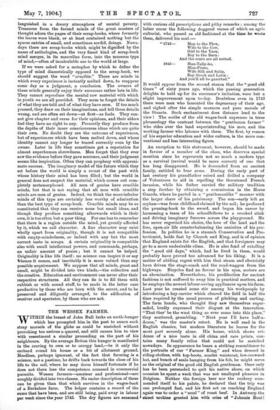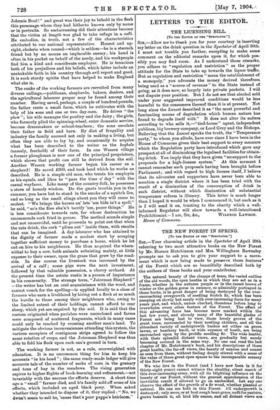with curious old prescriptions and pithy remarks ; among the
latter occur the following doggerel verses of which an agri-
culturist, who passed as old fashioned at the time he wrote them, delivered his soul :- " 1743— Man to the Plow,
Wife to the Cow, Girl to the Yarn, Boy to the Barn: And the rents are all netted.
1843— Man-Tally-ho, Miss-Piano, Wife Silk and Satin, Boy Greek and Latin : And you'll all be gazetted."
It would appear from the second stanza that the " good old times " of sixty years ago, which the passing generation delights to hold up for its successor's imitation, were but a slight improvement upon to-day. Doubtless even in 1743 there were men who lamented the degeneracy of their age, and sighed after the simple manners and pure morals of the Stuarts. Such enchantment does distance lend to the view ! The scribe of the old wages-book expresses in terse phraseology the contrast between the " gentleman farmer " who rides over the land superintending his men, and the working farmer who labours with them. The first, by reason of his superior education and wider culture, is the more con- ventional and less interesting figure.
An exception to this statement, however, should be made in favour of a member of the class, who deserves special mention since he represents not so much a modern type as a survival (revival would be more correct) of one that has long disappeared. Ho is descended from an ancient family, entitled to bear arms. During the early part of last century his grandfather raised and drilled a company of Volunteers to aid in repelling the threatened French invasion, while his father carried the military tradition a step further by obtaining a commission in the Horse Guards, where be parted in a "gentlemanlike " manner with the larger share of his patrimony. The son—early left an orphan—was from childhood claimed by the soil ; he preferred the pruning-hook to the sword, and began his career by harnessing a team of his schoolfellows to a crooked stink and driving imaginary furrows across the playground. He has never regretted his choice, the love of the land and the free, open-air life counterbalancing the anxieties of his pro- fession. In politica he is a staunch Conservative and Pro- tectionist, holds fast by Church and King, and is of opinion that England exists for the English, and that foreigners may go to a more undesirable clime. He is also fond of extolling the " good old days," which, had he lived in them, would probably have proved too advanced for his liking. It is a matter of abiding regret with him that steam and electricity have driven the stage-coach and the road-waggon from the highways. Bicycles find no favour in his eyes, motors are an abomination. Nevertheless, his predilection for ancient fashions is not suffered to sway him in practical matters, and he employs the newest labour-saving appliances upon his farm. Last year he created some stir among his workpeople by introducing a hay-carrier which cleared the field in half the time required by the usual process of pitching and carting. The farm hands, who thought they saw themselves super- seded, loudly expressed their disgust at the innovation. "That thee be the wust thing as ever come into this place," they muttered, grumbling. " Nest year I'll have half-a- dozen," was the master's retort. He is well read in the English classics, but modern literature he leaves for the
most part severely alone. His house, which shows evi- dence of a nice taste in old china and rare prints, con- tains many family relics that could not be matched nowadays. In appearance he bears a striking resemblance to the portraits of our " Farmer Xing," and when dressed in riding-clothes, with top-boots, scarlet waistcoat, low-crowned hat, and bunch of seals hanging from his fob, he might serve
as the original of the good old English gentleman. Once only has he been persuaded to quit his native shore, on which occasion he spent a week that was not unalloyed pleasure in Belgium. Neither the foreign beer nor the cookery com- mended itself to his palate, he declared that the trip was one prolonged fast, and his first act on reaching England
again was to order a " meal " of roast beef. In Antwerp the street urchins greeted him with cries of "Johnnie Boul!
Johnnie Boni!" and great was their joy to behold in the flesh this personage whom they had hitherto known only by name or in portraits. So embarrassing did their attentions become that the victim at length was glad to take refuge in a cafe. He embodies, in truth, not a few of the characteristics attributed to our national representative. Honest and up- right, choleric when roused—which is seldom—he is a staunch friend but by no means an implacable enemy; his hand is often in his pocke't on behalf of the needy, and his workpeople find him a kind and considerate employer. He is tenacious both of his prejudices and his beliefs, which latter include an unshakable faith in his country through evil report and good. It is such sturdy spirits that have helped to make England what she is.
The ranks of the working farmers are recruited from many diverse callings,—publicans, shepherds, bakers, dealers, and the agricultural labourer proper may be found among their number. Having saved, perhaps, a couple of hundred pounds, the father rents a small farm, which he cultivates with the help of his sons and one or two day-men. He drives " the plow"; his wife manages the poultry and the dairy ; the girls, who formerly plied the spinning-wheel, enter domestic service, become dressmakers or school-teachers; the sons emulate their father in field and barn. By dint of frugality and industry the family succeed not only in making a living, but often they are able to lay by, and occasionally to acquire what has been described to the writer as the keyhole (namely, freehold) of their farm. In one Wessex village a former ploughman is now one of the principal proprietors, which shows that profit can still be derived from the soil. Another Wessex working farmer began his career as a shepherd! He saved £300, and took land which he works as described. He is a simple old man, who treats his employes as his equals, and likes to " pass the time o' day " with the casual wayfarer. Like many of the country-folk, he possesses a store of homely wisdom. Do the gnats trouble you in the summer, you have but to stand in the smoke of a squitch fire, and so long as the smell clings about you they will cease to molest. " We brings the harses an' lets 'um bide hit a spell," he said, " so's the flies cha'n't tarrify 'um, pooer things." He is less considerate towards rate, for whose destruction he recommends cork fried in grease. The method sounds simple and not unmerciful, until he proceeds to point out that when the rate drink, the cork " plims out" inside them, with results that can be imagined. A day-labourer who has attained to the dignity of farmer made a modest start by scraping together sufficient money to purchase a horse, which he let out on hire to his neighbours. He thus acquired the where- withal to buy a cow, both animals subsisting mainly, at little expense to their owner, upon the grass that grew by the road- side. In due course the livestock was increased by the arrival of a calf ; some pigs were the next investment, followed by that valuable possession, a cherry orchard. At the present time the astute rustic is a person of importance in his community. The strange term, "Joiceman Shepherd" —the writer has but an oral acquaintance with the word, and cannot vouch for the spelling—is applied locally to a class of farmers who earn a livelihood by hiring out a flock at so much the hurdle to those among their neighbours who, owing to the limited extent of their holdings, cannot afford to rear sheep, which yet are required by the soil. It is said that the custom originated when parishes were unenclosed and farms were composed of scattered fragments, which in many cases could only be reached by crossing another man's land. To mitigate the obvious inconveniences attending this system, the various occupiers of contiguous strips agreed to follow the same rotation of crops, and the Joiceman Shepherd was thus able to fold his flock upon each one's ground in turn.
The working farmer is not, as a rule, overweighted with education. It is no uncommon thing -for him to keep his accounts " in his head " ; the same ready-made ledger will give accurate tale of the number of sacks of corn in the granary and tons of hay in the meadows. The rising generation aspires to higher flights of book-learning and refinemenk—not invariably with the success the efforts deserve. A short time ago a "small " farmer died, and his family sold off some of his effects, which included an aged black pony. When asked whether they intended to dispose of it, they replied : " No, we dwun't mean to sell he, 'cause that's poor pappa's heirloom."











































 Previous page
Previous page